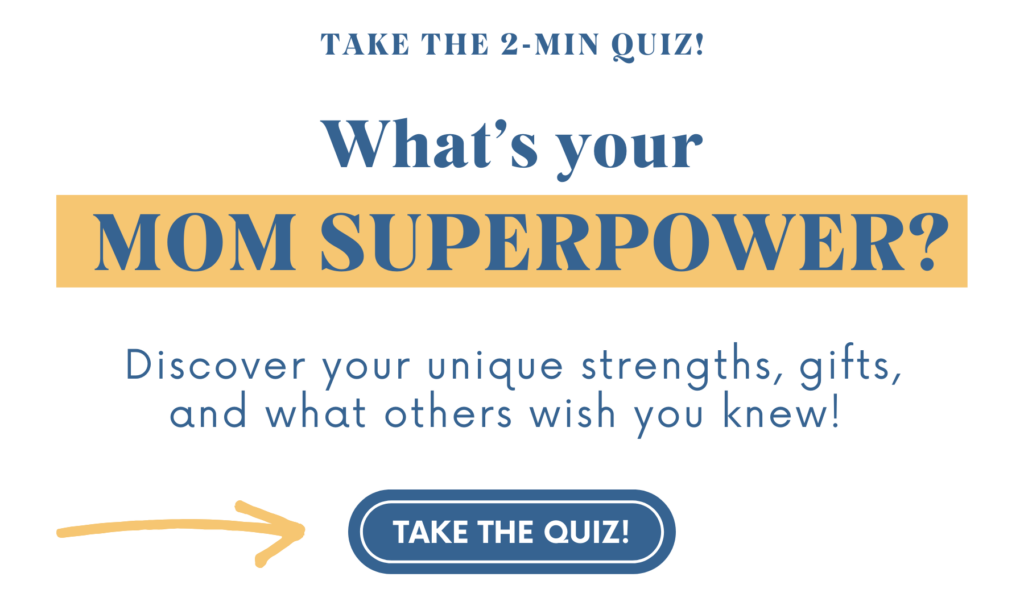You know building your brand is a crucial step to crafting your dream business. This workbook is designed with you in mind to simplify those steps.
Take the 3 day course building challenge
5 Ways to Identify Toxic Friendships for Christian Women
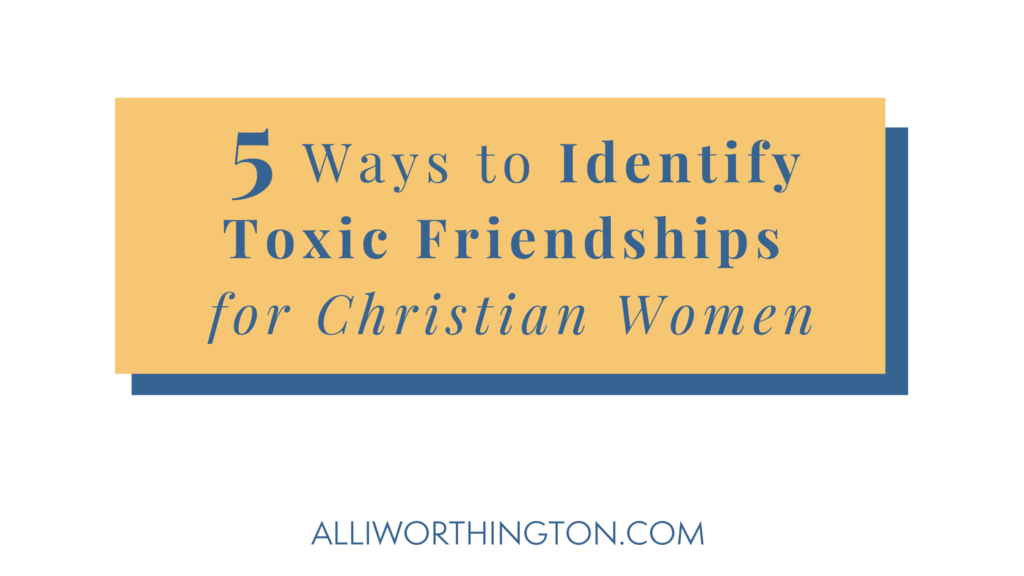
Friendships can play a significant role in our lives, providing support, encouragement, and companionship. However, not all friendships are healthy and beneficial. In fact, some of them can be downright toxic.
As Christian women, it is crucial to surround ourselves with individuals who uplift our spirits, share our values, and contribute positively to our spiritual growth. Because we have limited time to invest in friendships, we must determine the difference between friendships we should prioritize and those we should walk away from.
A toxic friendship is a close relationship that darkens the light of hope and joy in your life and stunts your personal development. The longer you remain in such a relationship, and the longer it continues to be toxic, the harder it will be to move away from it.
We will explore five key ways to identify toxic friendships. We will then look at how to nurture healthy relationships that bring joy and fulfillment.
1. Lack of Support: Recognizing Negative Influences
One of the fundamental aspects of a healthy friendship is mutual support. However, toxic friendships often lack genuine support, harming our emotional well-being. Christian women should be wary of friends who constantly criticize them, belittle their achievements, or dismiss their feelings and needs. Genuine friends embrace and celebrate our successes, tune in during difficult times, and encourage us in our faith journey.
If your friend encourages you to make bad decisions or to think negatively, you might be in a toxic friendship. Feeling bad after being with someone is a major red flag. Toxic people’s lack of respect for our values and opinions makes us uncomfortable.
2. Manipulation and Control: Guarding against Unhealthy Dynamics
Toxic friendships often involve manipulation and control, damaging our spiritual and emotional growth. As Christian women, we should be alert to friends who constantly try to control our decisions, guilt-trip us into actions that contradict our values, or employ emotional tactics to get their way. Healthy friendships are built on mutual respect and allow for individual autonomy, which will foster an environment of trust and freedom. You can learn more about safeguarding yourself as a Christian against toxic friendships with my friend Gary Thomas.
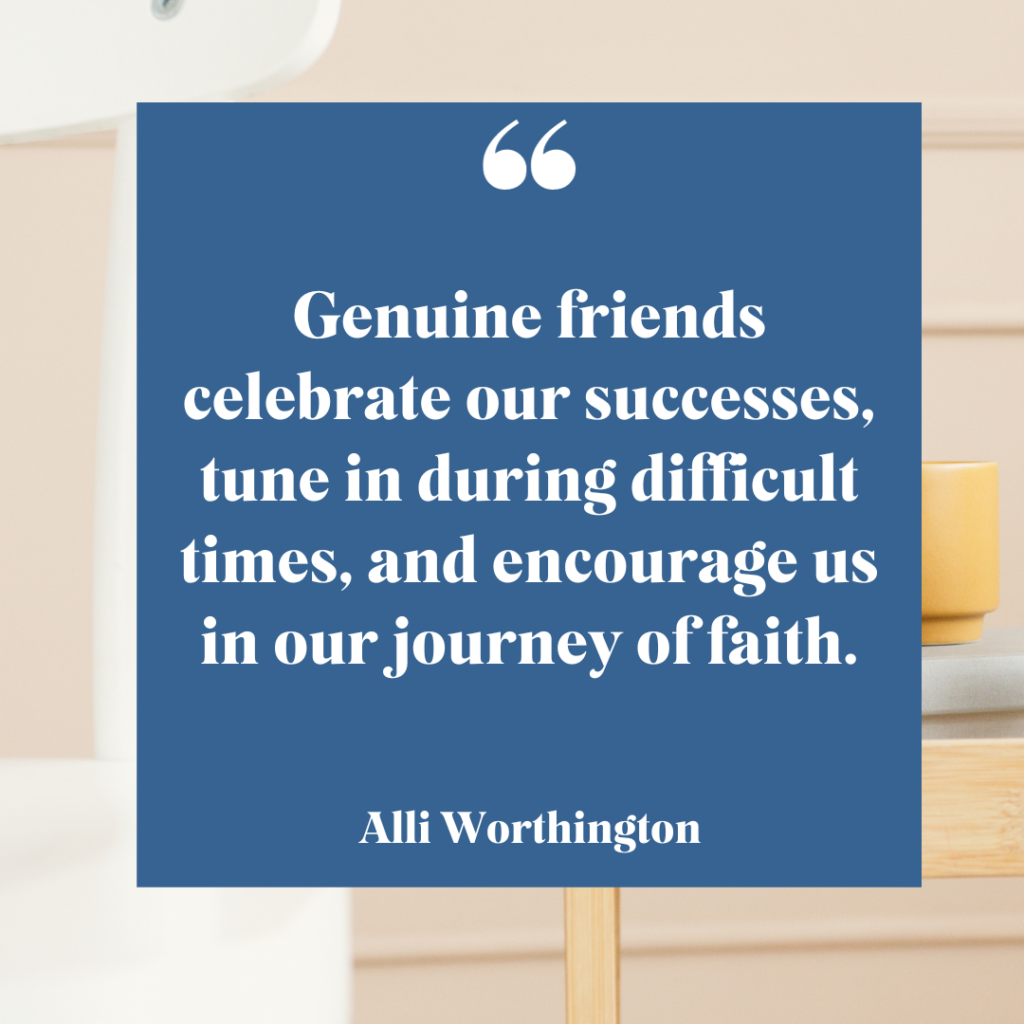
3. Constant Negativity: Surrounding Ourselves with Positive Influences
As followers of Christ, we are called to be light in the world, spreading love and joy. On the other hand, toxic friendships tend to bring constant negativity into our lives. Christian women should be mindful of friends who frequently complain, criticize without offering constructive feedback, or drain us emotionally. Healthy friendships contribute to our well-being by uplifting and encouraging us, fostering an atmosphere of positivity and growth.
Words matter. Passive-aggressive tones, critical statements, and back-handed compliments do not help build up our friendships. Interactions with friends should not leave you hurt. Empty jabs at our character can tear us down.
Toxicity can spread. If you’re finding that you don’t like who you are when spending time with that friend — chances are toxicity has overflowed into your life and actions. You might notice your habits change, and even your speech can sound more like that friend than your own.
If you think this might be a problem in your own life, I recommend exploring some other signs of toxic friendships.
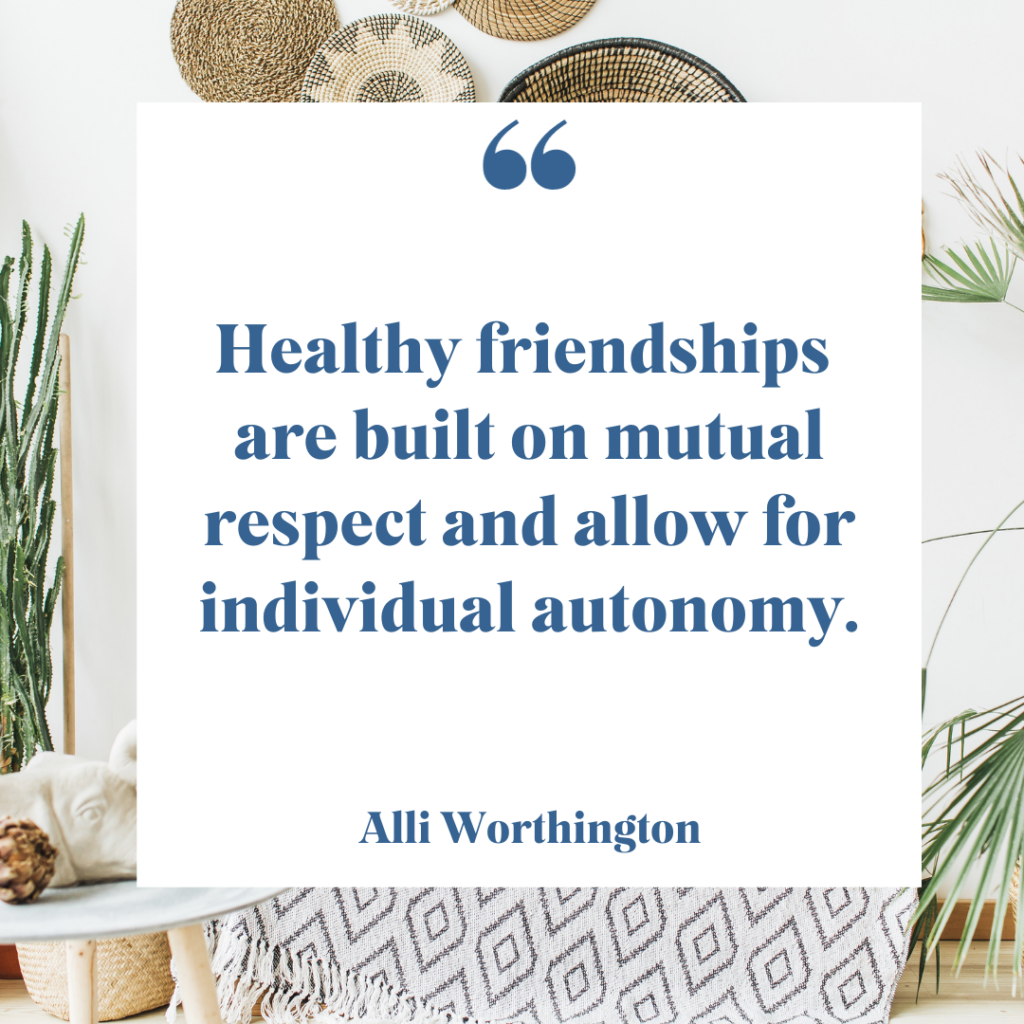
4. Lack of Respect for Boundaries: Honoring Godly Limits
Boundaries are essential in any relationship. Healthy friendships respect these boundaries. As Christian women, it is important to recognize when our friends consistently cross our boundaries, invade our privacy, or disregard our requests. Toxic friendships can hinder our spiritual growth and emotional well-being. By setting and enforcing Godly boundaries, we create an environment that fosters healthy relationships and honors God’s plan for our lives.
5. One-Sided Relationships: Seeking Healthy Reciprocity
A healthy friendship is characterized by mutual give-and-take. However, toxic friendships often exhibit an imbalance in the level of effort, support, and compromise. Christian women should be cautious of friends who rarely reciprocate gestures of kindness, support, or compromise. Nurturing healthy friendships requires us to surround ourselves with individuals who value and invest in the relationship, ensuring mutual growth and fulfillment.
Walking on eggshells is as uncomfortable as it is impractical. If you’re living in fear of how your friend will react to your words or actions — it’s toxic. You lose the freedom to be yourself, and your friend will miss out on the gift of you. One of the best parts about friendship is being able to express your full self within that relationship: every quirk, every joke, every intricacy of what makes you unique, and knowing that it won’t be judged — or at the very least, will be forgiven.
Another trait of a toxic friendship is that you fear the friend could leave at any moment because of something you did or didn’t do. When this happens, the friendship is no longer meaningful. It becomes weaponized, instead.
You’re not to blame. Well, not always. We take on our fair share of responsibility in relationships, for better or worse. Just ask any married couple! But something is off when one person, guilty or not, constantly takes on that blame. If you’re taking on the blame to avoid conflict, that’s not a healthy friendship.
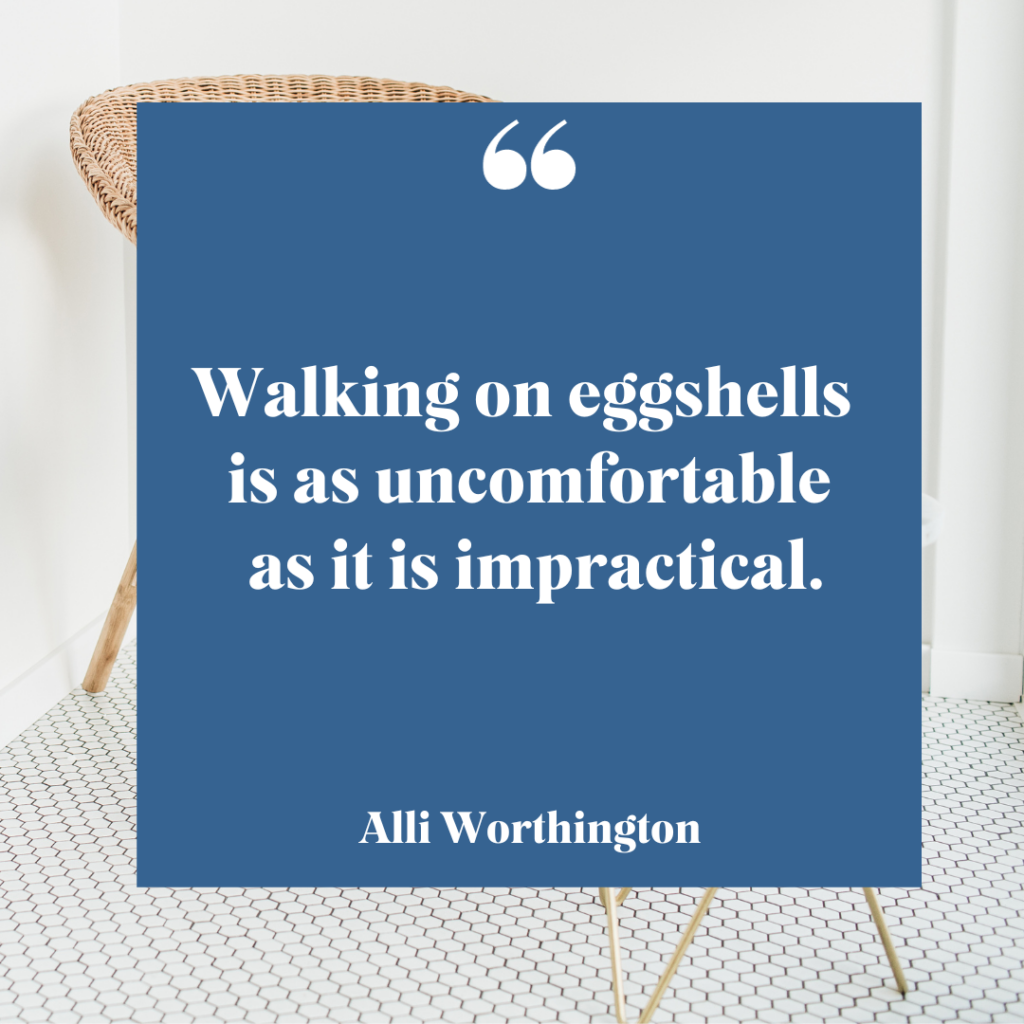
Now What?
Now that we’ve identified what toxic friendships can look like — what do we do about it? This is a hard pill to swallow — but having no friendships is better than having toxic friendships. As generous women, extending a second, third, or even more chances for that friend to change is tempting. But in many cases, it will be best to let that friendship go to protect our mental, emotional, and spiritual health.
Breaking Up is Hard to Do
Ending a friendship can be necessary and hard. But staying in a friendship that hurts is harder. There are two main points to remember when breaking up with a friend: be direct and rehearse.
Be direct. Communication is key. State your reason and how you feel. Share with grace and honesty. If you intend to end the friendship, you’ve got nothing to lose in speaking the truth.
Rehearse. Practice what you’re going to say to a friend – out loud. It can be tempting to only think about the words we will say, but we must also practice speaking them. Remember, you can only control your statement, not how others react.
I had a great conversation with my friend, Laura Tremaine, about holding space for friendship break-ups and how to move past them.
Are Second Chances Possible?
Yes, but proceed with caution. A friend’s toxic behavior often has nothing to do with you, so continuing to be their friend will not necessarily solve it. If you want to give your friend another shot at friendship, do it with wisdom.
- Be Direct – Treat this like you would if you intended to break up the friendship. Tell your friend your “why” and how it makes you feel.
- Set Boundaries – Toxic friends should not have full access to you after they’ve proven they cannot be trusted. Start creating barriers between you and your friends. Learn more with Sasha Shillcutt as she defines boundaries and how you can live your life in a way that reflects your priorities.
- Take Time – Distance (physical, mental, and emotional) from a toxic friendship can help you see more clearly. Reflecting on the friendship and how you’ve benefited from it can allow you to decide to continue, give it a second chance, or find the clarity you need to call it quits.

Stop Toxic Friendships Before They Start
Best friends are great, but no one person can always be your go-to person. And you can’t be someone else’s. No one friend can meet every need. Having different friends to lean on in different seasons is key. Cultivating multiple relationships within your community also keeps everyone from experiencing relational burnout.
Find faith-filled Friends. Ones that stir up the gift of faith in each other (2 Timothy 1:6). Find friends that can come alongside you. Pray for you. Encourage you. Friends that keep you accountable in your walk with Jesus.
Not all friends are forever friends. And that’s okay. It is not easy to block all negative people in your life. You won’t need to ignore them completely. All you have to do is change the frequency of interacting with them. Your future self will thank you for setting boundaries with toxic friends and pursuing healthy relationships. The ones that point you toward God’s love are worth investing in.
As Christian women, it is essential to cultivate healthy friendships that uplift and inspire us in our faith journey. By identifying toxic friendships, we can protect ourselves from emotional harm and create space for positive, God-honoring relationships.
Remember, healthy friendships are characterized by genuine support, respect for boundaries, positivity, and mutual reciprocity. Surround yourself with friends who share your values, encourage your spiritual growth, and help you become the best version of yourself. With God’s guidance and discernment, you can build a network of uplifting friendships that bring joy, love, and fulfillment into your life.
Want to learn more about how you engage in friendships? Take this quiz to find out your superpower!
